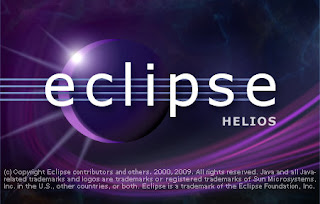Eclipse IDE, the most popular open source Java IDE, has released version 3.6 codenamed Helios.
Download Eclipse 3.6 here.
New features in Eclipse IDE 3.6 include:
For more information check out Eclipse 3.6 release announcement.
- A new Linux IDE package makes it easier for Linux developers to use an integrated tool chain for building C/C++ applications for the Linux operating system. This package includes the new Linux Tools project which includes Eclipse integrations of popular Linux utilities such as GNU Autotools, Valgrind, OProfile, RPM, SystemTap, GCov, GProf, and LTTng. A recent Eclipse Community Survey has shown increased use of Linux by developers. It is expected this package will help further accelerate Eclipse adoption in the Linux community.
- Eclipse Marketplace Client provides developers an 'app-store' experience to easily discover and install new Eclipse plug-ins. Eclipse Marketplace is a catalog of Eclipse based solutions. Over 100 of these will be available from the new Marketplace Client, making it significantly easier to find and install Eclipse solutions.
- Support for Git, a popular distributed version control (DVCS), is provided by the new Eclipse EGit and JGit projects. The new EGit 0.8 release includes a new Git repositories view and support for fast forward merging and tagging. JGit 0.8 - which EGit uses under the covers to talk to Git repositories - benefited from performance enhancements of up to 50% when working with large repositories.
- The Web Tools Platform project has introduced support for creating, running, and debugging applications written for the latest Java EE Specifications (Java EE 6) including, Servlet 3.0, JPA 2.0, JSF 2.0, and EJB 3.1.
- Improved support in the JavaScript Development Tools project (JSDT) for JavaScript developers, including a JavaScript debug framework that allows for integration of JavaScript debuggers, such as Rhino and Firebug. A new JavaScript IDE package has also been created to make it easier for JavaScript developers to find, install and use an Eclipse-based IDE.
- Eclipse Xtext 1.0, a popular framework for creating domain specific languages (DSL), introduces 80 new features, including improved performance and scalability by up to 30 times previous versions. A new in-memory indexing feature makes it possible to develop more sophisticated DSL's in Xtext.
- A new release of Acceleo 3.0 implements the OMG Model-to-text (MTL) specification and provides the features required for a code generator IDE. This release also provides unique tools around example-base design of code generators.
To learn more about Eclipse platform programming, I highly recommend Eclipse Rich Client Platform (vogella series) by Lars Vogel. It's really good for learning Eclipse RCP/RAP development, most of the things that apply to RCP also applies to RAP. In fact, you can single-source an application to two target platforms (RCP for desktop, RAP for web) simultaneously. :-)

No comments:
Post a Comment